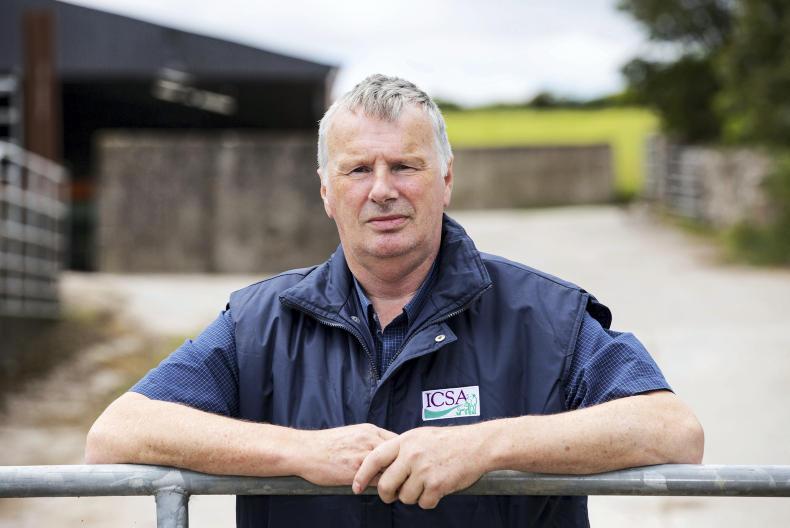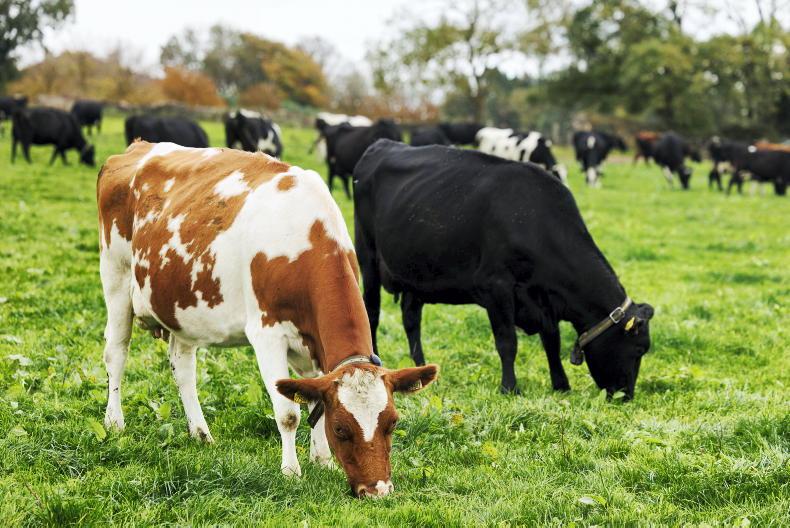An extraordinary agricultural programme must be established to support farmers through the crisis sparked by COVID-19, according to the Irish Cattle and Sheep Farmers’ Association (ICSA).
The ICSA stressed that the “stretched resources” of the CAP would not be sufficient to keep farmers viable. It wants the European Central Bank (ECB) to make extra funds available in addition to the CAP to fund the extraordinary programme.
Banks
ECB funding should also be made available to banks, ICSA president Edmund Phelan said, as it would allow repayment holidays on bank loans and additional low-cost credit to support cashflow on farms.
Farmers should be able to sell stock to meat factories or feedlots
“The closure of marts coupled with serious volatility in the beef and lamb markets will play havoc with the cashflow on many farms at a time when money will be needed for fertiliser, meal, diesel and, shortly, for first-cut silage,” Phelan said.
He called on the Government to push pillar banks to offer a one-year repayment holiday on farm and business loans.
The repayments should be added to the end of the loan without penalty, while bank liquidity is supported with equivalent money from the ECB, Phelan set out.
Vulture funds should also be forced to comply, he said.
Crisis fund
Phelan wants a crisis fund set up under the programme to support aids to private storage or intervention buying for beef and lamb.
He stressed it should only be for limited quantities where specific markets, such as McDonald’s or lamb demand in France, had evaporated.
The price levels should be set as to avoid price drops for farmers, he said.
Phelan added: “We should also examine the case for a price collapse support fund along the lines of BEAM, but covering the sheep sector as well as the cattle sector.”
On the consumer end, Phelan wants the programme to provide funding for the promotion of fresh meat products from the EU.
Farmer supports
To support farmers who are forced to self-isolate, Phelan said: “Farmers are extremely worried about how their farm will be managed if they get sick and it is clear that the €350/week payment will not pay for replacement labour at a busy time.”
He also backed moves for greater flexibility around testing requirements for schemes and TB.
“We cannot have a scenario where unnecessary farm inspections are taking place for fear of EU sanctions or delays in payments.”
In addition to farmers being able to delay TB tests, Phelan insisted farmers should be able to sell stock to meat factories or feedlots and that limits on buying in stock are set aside.
Other measures outlined by the ICSA include allowing marts to facilitate sales and keeping live exports moving.
Read more
EU allows member states pay up to €100,000 to farmers
Emergency support plan needed to support farmers – Sinn Féin
An extraordinary agricultural programme must be established to support farmers through the crisis sparked by COVID-19, according to the Irish Cattle and Sheep Farmers’ Association (ICSA).
The ICSA stressed that the “stretched resources” of the CAP would not be sufficient to keep farmers viable. It wants the European Central Bank (ECB) to make extra funds available in addition to the CAP to fund the extraordinary programme.
Banks
ECB funding should also be made available to banks, ICSA president Edmund Phelan said, as it would allow repayment holidays on bank loans and additional low-cost credit to support cashflow on farms.
Farmers should be able to sell stock to meat factories or feedlots
“The closure of marts coupled with serious volatility in the beef and lamb markets will play havoc with the cashflow on many farms at a time when money will be needed for fertiliser, meal, diesel and, shortly, for first-cut silage,” Phelan said.
He called on the Government to push pillar banks to offer a one-year repayment holiday on farm and business loans.
The repayments should be added to the end of the loan without penalty, while bank liquidity is supported with equivalent money from the ECB, Phelan set out.
Vulture funds should also be forced to comply, he said.
Crisis fund
Phelan wants a crisis fund set up under the programme to support aids to private storage or intervention buying for beef and lamb.
He stressed it should only be for limited quantities where specific markets, such as McDonald’s or lamb demand in France, had evaporated.
The price levels should be set as to avoid price drops for farmers, he said.
Phelan added: “We should also examine the case for a price collapse support fund along the lines of BEAM, but covering the sheep sector as well as the cattle sector.”
On the consumer end, Phelan wants the programme to provide funding for the promotion of fresh meat products from the EU.
Farmer supports
To support farmers who are forced to self-isolate, Phelan said: “Farmers are extremely worried about how their farm will be managed if they get sick and it is clear that the €350/week payment will not pay for replacement labour at a busy time.”
He also backed moves for greater flexibility around testing requirements for schemes and TB.
“We cannot have a scenario where unnecessary farm inspections are taking place for fear of EU sanctions or delays in payments.”
In addition to farmers being able to delay TB tests, Phelan insisted farmers should be able to sell stock to meat factories or feedlots and that limits on buying in stock are set aside.
Other measures outlined by the ICSA include allowing marts to facilitate sales and keeping live exports moving.
Read more
EU allows member states pay up to €100,000 to farmers
Emergency support plan needed to support farmers – Sinn Féin









SHARING OPTIONS